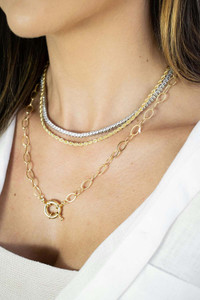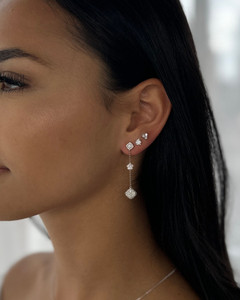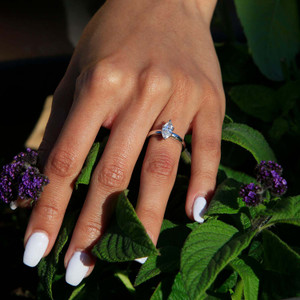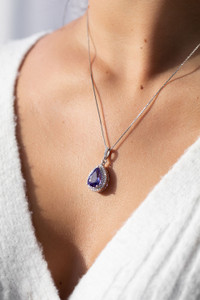The Etiquette of Wedding Band Purchases: A Modern Guide

When it comes to tying the knot, one of the most enduring symbols of love and commitment is the wedding band. These precious rings, often adorned with diamonds or other gemstones, serve as a daily reminder of the vows exchanged between partners. But in today's evolving landscape of relationships and wedding traditions, a common question arises: Who should buy the wedding bands?
The Changing Landscape of Wedding Ring Traditions
Historically, the responsibility of purchasing wedding bands fell along traditional gender lines. The groom typically bought both rings, mirroring the custom of providing an engagement ring. However, as societal norms shift and couples seek more equitable partnerships, the etiquette surrounding wedding band purchases has become more flexible.
Today's couples are reimagining this aspect of wedding planning, often opting for approaches that better reflect their unique relationships and financial situations. From splitting costs to joint shopping experiences, the modern era has ushered in a variety of ways to handle this significant purchase.
Factors to Consider When Deciding Who Buys the Wedding Bands
Before diving into the various approaches couples take, it's essential to consider the factors that might influence your decision:
- Financial Dynamics
Every couple's financial situation is unique. Some may have disparate incomes, while others maintain separate or joint accounts. Consider your current financial setup and discuss how the purchase of wedding bands fits into your overall budget.
- Personal Values and Beliefs
Some couples place high importance on adhering to traditional customs, while others prefer to forge their own path. Reflect on what feels authentic to your relationship and aligns with your shared values.
- Cultural Background
Different cultures have varying customs when it comes to wedding jewelry. Some may expect family members to contribute, while others view it as a strictly personal expense. Be mindful of any cultural expectations that might influence your decision.
- Individual Preferences
One partner might have a strong desire to surprise the other with a carefully selected band, while some couples prefer to shop together to ensure both are happy with the choices.
- Wedding Budget Allocation
Consider how the cost of wedding bands fits into your overall wedding budget. Some couples choose to prioritize ring expenses, while others may allocate more funds to other aspects of the celebration.

Popular Approaches to Purchasing Wedding Bands
Now that we've explored the factors to consider, let's delve into some common approaches couples take when deciding who buys the wedding bands:
- The Traditional Route: One Partner Purchases Both Rings
In this scenario, one partner (traditionally the groom) takes on the responsibility of buying both wedding bands. This approach can work well if there's a significant income disparity between partners or if one person has a strong desire to gift the rings to their spouse-to-be.
Pro: It maintains a sense of tradition and can be a meaningful gesture.
Con: It may put financial strain on one partner, especially when considering high-end options like diamond wedding rings or diamond wedding bands.
- Splitting the Cost: A Modern Compromise
Many contemporary couples opt to split the cost of their wedding bands. This approach aligns with the idea of an equal partnership and shared financial responsibilities.
Pro: It's a fair and balanced approach that reflects modern values.
Con: It may require more coordination and potentially compromise on individual preferences.
- Each Partner Buys Their Own Ring
Some couples choose to have each person purchase their own wedding band. This method allows for maximum personal expression and financial independence.
Pro: Each partner can select a ring that perfectly suits their style and budget.
Con: It may lack the symbolic exchange of rings that some couples find meaningful.
- Joint Shopping Experience: Choosing Together, Paying Together
Many couples are opting to shop for wedding rings online or in-store together, treating it as a shared experience and expense. This approach combines the best of both worlds – personal choice and shared decision-making.
Pro: It ensures both partners are happy with the selections and can lead to a fun, bonding experience.
Con: It may be challenging to surprise each other or maintain an element of tradition if desired.
- Family Contribution: A Generational Gift
In some cultures, or families, parents or other relatives may offer to purchase the wedding bands as a gift to the couple. This can be a meaningful way to involve family in the wedding preparations.
Pro: It can be a significant financial relief and a treasured family gesture.
Con: It may come with expectations or limit the couple's freedom of choice.
Trending Styles in Wedding Bands

As you consider who will purchase the wedding bands, it's worth exploring some popular styles that might influence your decision:
Diamond Wedding Rings: A timeless choice, diamond wedding rings add sparkle and elegance to the traditional band. These can range from simple pave settings to more elaborate designs featuring larger center stones.
Diamond Wedding Bands for Women: Many brides opt for diamond-encrusted bands that complement their engagement rings. These can be worn alone or as part of a stunning bridal set.
Diamond Band Rings: A versatile option, diamond band rings can serve as both wedding bands and fashion accessories. They come in various widths and styles, from delicate eternity bands to bold statement pieces.
Diamond Wedding Bands: Not just for women, diamond wedding bands for men have gained popularity in recent years. These can feature channel-set diamonds or more subtle diamond accents.
Mixing Metals and Materials: Some couples choose to incorporate different metals or materials into their wedding bands, such as combining rose gold with platinum or integrating alternative materials like wood or ceramic.
Customization and Personalization: Many jewelers now offer customization options, allowing couples to create truly unique wedding bands that reflect their personalities and relationship.
Tips for Purchasing Wedding Bands
Regardless of who ultimately buys the wedding bands, here are some tips to ensure a smooth purchasing process:
- Start Early: Begin shopping for wedding rings at least 3-4 months before the wedding to allow time for sizing, customization, and potential exchanges.
- Set a Budget: Determine how much you're willing to spend on wedding bands before you start shopping. This will help narrow down your options and prevent overspending.
- Consider Lifestyle: Think about your daily activities and choose a ring that will be comfortable and practical for everyday wear.
- Research Metals: Familiarize yourself with different metal options, such as platinum, gold (in various colors), and alternative metals like titanium or tungsten.
- Explore Online Options: Many reputable jewelers offer wedding rings online, providing a wide selection and often at competitive prices. Just be sure to read reviews and understand return policies.
- Think Long-Term: Choose a style that you'll be happy wearing for years to come, rather than following fleeting trends.
- Consider Insurance: Protect your investment by insuring your wedding bands, especially if you've chosen valuable diamond wedding rings.
Making the Decision Together
Ultimately, the decision of who buys the wedding bands should be made jointly by the couple. Here are some steps to guide your conversation:
- Open Communication: Discuss your thoughts, preferences, and any concerns openly and honestly.
- Consider Your Finances: Review your individual and joint financial situations to determine the most practical approach.
- Reflect on Your Values: Think about what feels right for your relationship and aligns with your shared values.
- Explore Options Together: Even if you decide to purchase rings separately, consider browsing styles together to ensure you're on the same page.
- Be Flexible: Be willing to compromise and find a solution that works for both partners.
- Focus on the Meaning: Remember that the most important aspect of wedding bands is what they symbolize, not who pays for them.

Conclusion: A Symbol of Your Unique Love Story
In the end, there's no one-size-fits-all answer to who should buy the wedding bands. What matters most is that the decision reflects your relationship and sets a positive tone for your future together. Whether you opt for dazzling diamond wedding rings, elegant diamond bands, or simple classic styles, your wedding bands should be a cherished symbol of your commitment to one another.
By approaching this decision thoughtfully and collaboratively, you'll not only end up with beautiful rings but also strengthen your partnership in the process. After all, your wedding bands are just the beginning of the many decisions you'll make together on your lifelong journey of love and companionship.





